As we now do children's lesson about programmers and programming with broadcast
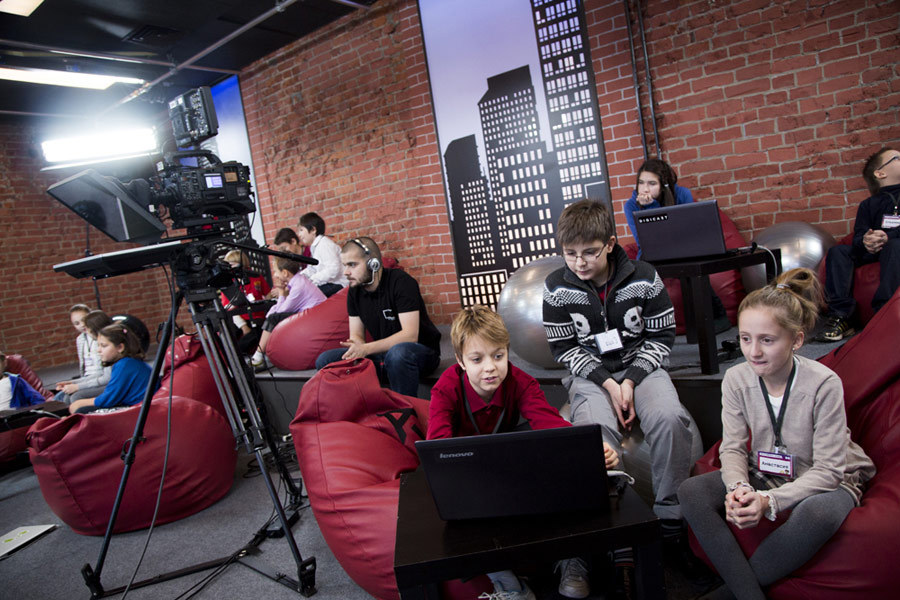
Test run
In a post about the problems of children's education, I promised to show the history of preparation for the first lesson. This is a lesson about programming and programmers. The first is because there is nowhere without IT. Because children have long been living in the digital world, in which we are simply immigrants.
It all started with the fact that at Digital October we worked closely with the scientific and technological get-together, and there were no problems with inviting lecturers from around the world (from Wolfram to key people from Yandex). Then we decided to make a good kind children's educational program. It was supposed a chain of lessons, merging school knowledge in the synthesis. For example, that biology is needed by designers and so on. It had to be a video in order to interest the children, and then books, applications, circles in the cities - so that the children would develop later.
')
After the success of the “adult” KnowledgeStream, I decided to make a program for children in a similar format. We found internal resources without sponsors, only with friends we made a pilot lesson about the human skeleton with a professor of medicine, an anthropologist, a robot technician (who came with a robot) and a living cosmonaut. Plus children from online.
Even before shooting the pilot, I talked for a long time with Google, the Russian office really liked the idea, the project was supposed to be made bilingual and international. PR-director Alla gave a lot of practical advice and helped as she could. Unfortunately, it was not possible to reach an agreement with Google due to age restrictions on the company's social services, most of which belong to the 14+ category. And this already imposed the need for a complete revision of the concept.
One more children's project (about him below) we referred to the Government of Moscow. Our contact was very competent, he became interested in our project, and in a record short time, made an appointment. Everything went quickly and clearly. He was well versed in the subject of education, he knew about our other projects. We have almost secured the support of the Government of Moscow, the project had to be postponed. It was necessary to start everything from the very beginning, but there was no time - we just launched the Russian Kurse.
About the first lesson
To begin, I will tell a little more detail about the pilot with the human skeleton.
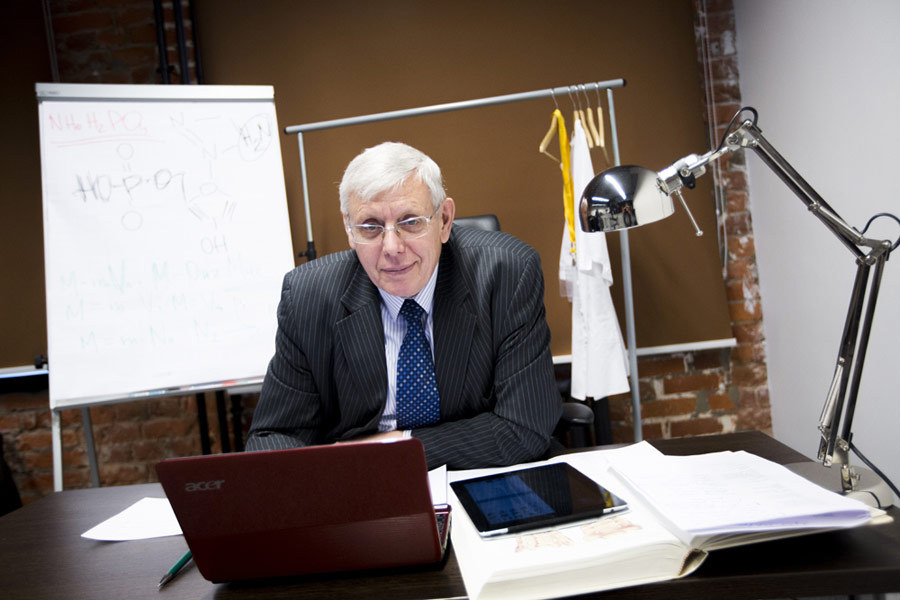
The lesson went like this: Oleg Stefanovich Medvedev, a professor of medicine at Moscow State University, told me why the skeleton is needed at all, gave the children the task of finding the Internet and showing the exercises that keep the spine in shape. Denis Pezhemsky, an anthropologist, explained that scientists can learn from the excavations. Roman Zhukov, a robot, showed the similarities and differences between the human skeleton and the robot, and in general about how knowledge of the human device is used by engineers in their work. And he brought a robot, which the children for a long time after the shooting was not released at all. Alexander Ivanovich Lazutkin, an astronaut, spoke very interestingly about space, how the skeleton and muscles are seriously affected in zero gravity, and that you need to play sports, told you that it’s cool to do exercise bikes, and you can see the ground beneath you in the porthole. I was surprised that birds do not survive in weightlessness: the chicks cannot feed. The astronauts had eggs with them, they hatch chicks, but they did not survive, could not eat.
Here's what happened:
This is what we wanted in perspective:

Another project
In parallel, we tried the project “My business” - excursions to different companies. First we went through the same Digital October with the children of the preschool group. The children were simply in a wild delight, and then every parent called me and asked what we were doing with them. Everyone wanted to be operators, engineers and directors and work only with us. From this point on, I realized that I had to do something about it too.
The plan was:
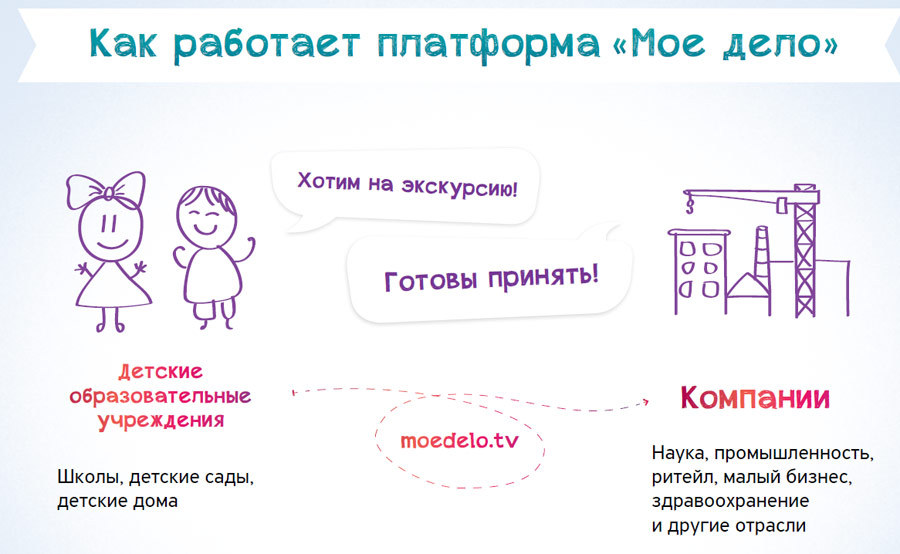
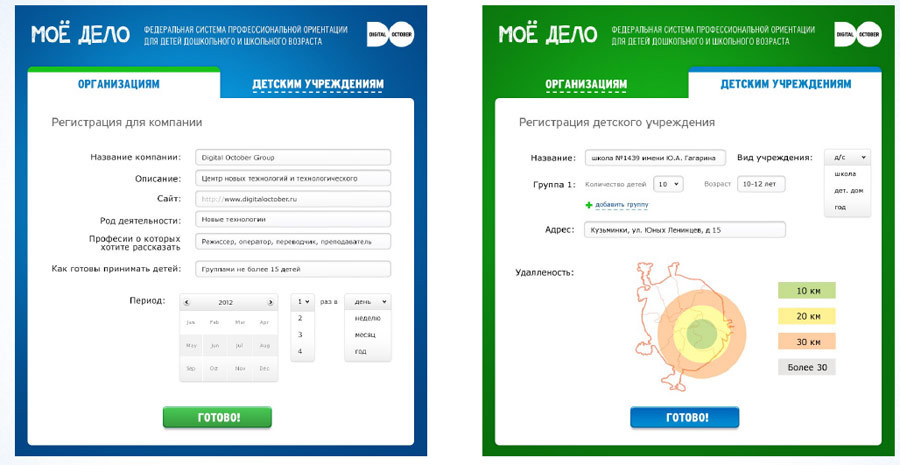
I wanted to bring all this to autonomy after the first 50 excursions, so that the schools themselves could find enterprises and vice versa, people would make videos themselves, etc.
Let me remind you that we could not allow ourselves to focus on children - it was necessary to support this adult education:
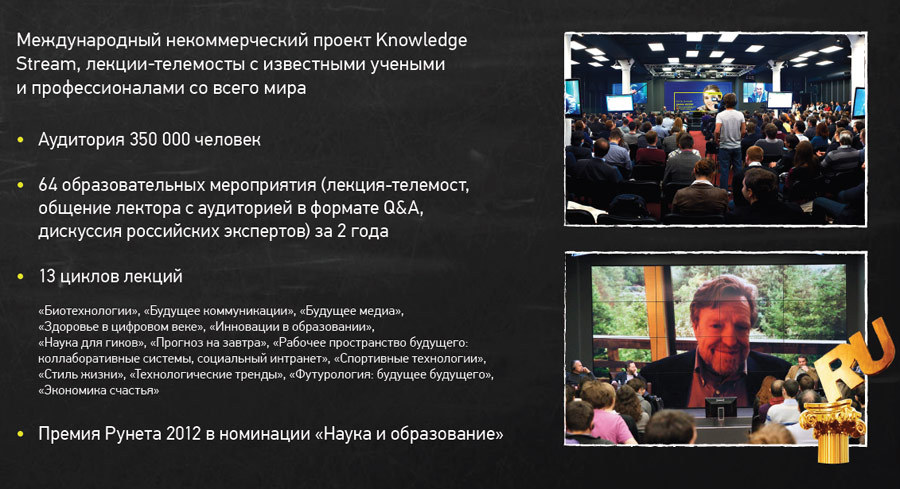
Plus was the Russian Curser.
Last year I finished projects with Cursera, Digital October, Knowledge Stream, left all the work and decided to deal only with children's education. We founded NGOs, but even for NGOs, investments were needed. They were given by the co-founder of Uniteller, a man who initially supported Postnauk. Now he is engaged in the development of children's education - inlearno.ru and znanika.ru projects.
The first lesson about programmers and programming
Now what we did for the first broadcast. The first step is to gather experts. We began to actively seek partners among those involved in schooling.
- We met with codabra.org, Dima Lokhansky , a cloud coder, one of the founders of Oversan-Skalaksi, a good person. The desire is to teach children not only to code, but to own the tools of the digital environment and to do what they really love - to draw cartoons, make games, and so on. He wants to make a volunteer movement out of this thing so that coders spend an hour a week teaching children in simple schools. They already have followers in Penza and not only. With him, we did the first lesson at school, recorded it on video, so that it was easier for the volunteers of Kodabra to conduct their events. Here's what happened:
- Then Grisha Kondakov from Yandex, one of the founders of the SAD, was found. He makes a math app for the beginnings (and several other subjects of the school curriculum) that quickly and efficiently teaches children to click school examples like nuts. At the same time it is so cool that my daughter Vera washed all the dishes at home so that I would allow her to “play” it further. Grisha is already experimenting in schools in Astrakhan and Moscow, and plans to develop the product in the direction of the platform with the ability to create original curricula based on the templates provided. At the EdCrunch conference, we conducted an open lesson with elementary school children using this technology. This is a great tool for personifying the educational process, the teacher has his own interface through which everything that the student does is visible: from the correctness of decisions to the time spent on tasks. You can, for example, quickly understand where the gap in knowledge and give the task to repeat the material to a particular child.
- It is planned to cooperate with the school in Montenegro, which make remote learning English for elementary school on the basis of ordinary school subjects. The program is certified by Cambridge. In fact, this program will allow the child to know English at a fairly decent level, sufficient for learning the language. But that's not all, the founder of the school is not just a director (this is not a business for him, but rather the ability to control and make effective the process of teaching his children), but an engineer-data scientist. He himself developed a system that allows you to combine data from all schools that study and pass unified Cambridge examinations - and you have the opportunity to see the child’s progress throughout the training + his position in comparison with all children from all over the world (Cambridge one of the most used in elementary schools around the world) or you can simply see the data on how your child compares with the average level of a particular exam in Canada, India or Bulgaria. Learning from them will be paid, 5 hours a week remotely, and face-to-face meetings with children and their parents are assumed to maintain contact and communication. The age of children is 6-8 years. Prodlenka plans to support this project at the experiment stage, we will help to organize a group, we will provide offline classes If you are interested, leave a mail, we will contact when we settle all the details and start recruiting for the first free test group.
- Mosigra joined with its experience in game development and psychological developments in the last year of studying children's cognitive processes. You have already seen the game “ Taxi ”, it will just be in class in a very tight form.
So, this is what happens:
- Lead - bobuk from Yandex.
- Initially, Yandex will talk about the profession of the programmer as a whole, career options, what interesting tasks there are, where strength is needed. Simple and understandable to children and their parents, who call the system unit a processor.
- Games from Mosigra.
- Dima Lokhansky, Kodabra - show a short video about a lesson at school. He will tell about his experience and what he does in the framework of Kodabra.
- At some point, we realized that we have only men in the speakers. And we decided to find the best girl coder. There will be Anna Melekhova, the leading programmer of Parallels.
- We give a link to the site for additional materials. There - manuals, books, a list of interesting additional educational institutions in the cities, children's educational applications, foreign courses, online schools and so on.
Plus, we are now agreeing with different “just developers” about short speeches. This week we will have several “runs” with speakers, and a dress rehearsal. So maybe there will be changes in the script.
Why all this, why and how - I told a little bit earlier, in a post about the problems of children's education in Russia . A little more details about the first lesson are right here .
Source: https://habr.com/ru/post/248307/
All Articles